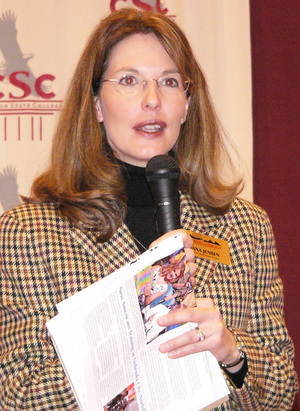CSC planning to join program that helps Nebraska's rural communities

Help is available these days to Nebraska’s umpteen rural communities that are struggling to keep their Main Street businesses open and at least maintain their population.
During last week’s Ag Entrepreneur Workshop at Chadron State College, a video was shown and literature distributed about HomeTown Competitiveness, a relatively new entity that is designed to help rural communities thrive and survive.
HTC is about four years old and is a spinoff from the Nebraska Community Foundation, a statewide nonprofit organization based in Lincoln. The program’s basic goal is to provide opportunities for young people in rural Nebraska to remain in their hometowns or to entice some of those who have left to return.
A $2 million grant that NCF received last September from the W.K. Kellogg Foundation is helping support the HTC’s initial activities.
Chadron State is planning to become a partner in HTC. While all the details of CSC’s involvement in the program haven’t been ironed out, the partnership will be part of the efforts that President Janie Park is initiating for Chadron State to provide more economic development and cultural assistance to communities in its far-flung service area.
During the workshop, Jana Jensen, a ranch wife from Bingham and an assistant development director for the Nebraska Community Foundation, told of some of the successes HTC has already had.
“HTC may not be the silver bullet, but it can help change attitudes and provide hope that you can work and live in Nebraska,” Jensen said. “Hope no longer needs to be an export commodity.”
HTC has a four-pillared approach. The first pillar is capturing the transfer of wealth so that a portion of the staggering $94 billion in cash and assets owned by the senior citizens in rural Nebraska will remain in the hometown communities through estate planning. Properly directed gifts can help create new economic opportunities and benefit the next generation, organizers point out.
Many people would like to leave a part of their estates to their hometowns and feel more comfortable in doing this if there’s a well-managed endowment available to receive the assets, Jensen noted.
Creating new leadership, or passing the torch to the younger generation, is another pillar. Mentoring by proven leaders to help the replacements be effective in their new roles is a major part of the plan. In some instances, those who have the wealth that will be passed on in due time also are the mentors.
The third pillar is energizing entrepreneurship, or striving to create new jobs and wealth. Often it can be closely related to the second pillar.
The fourth and perhaps most important pillar is engaging and attracting young people to assume the leadership roles, take over the existing businesses and create new ones and provide opportunities to keep the economy flowing in the small towns across Nebraska.
“We want to build on the assets communities already have, add to their value whenever possible and create new opportunities,” said Jensen at the workshop at CSC. “Getting the youth involved is very important. Youth are the prize asset of every community and they can provide fresh ideas, energy and leadership.”
HTC is already off and running. The first community to sign up was Ord in 2002. Since then, Jensen said 60 new jobs have been created and several businesses that were threatening to close because the owners were ready to retire have been transferred to new blood.
The program in Ord included several lists. One was a list of employment needs by local businesses. Another contained services the community needed, but didn’t have. A third contained names of people indicating they would like to return to Valley County where Ord is located and what their skills and interests are.
Jensen said at least 10 young couples who wanted to raise their families in small towns have moved to Ord. In addition, an endowment created to lend economic support to worthy projects in the community already has nearly $2 million in it and pledges and commitments totaling $6.8 million.
Ord’s enthusiastic leadership is said to be responsible for beating out three other contenders as the site for a $75 million ethanol plant to be built there by a Minnesota firm. The plant is expected to provide 35 jobs and inject $50 million in tax revenue during the next 10 years.
Jensen also has helped activate HTC in the Holt County communities of O’Neill, Atkinson and Stuart and Hyannis and Mullen along Highway 2 in the Sandhills.
She said three new businesses have opened in Mullen and two other businesses that were being operated by people in their 80s have been transferred to those looking to remain in the community.
Both Hyannis and Mullen have started endowments with at least $50,000 in them.
Following her presentation at the Ag Entrepreneur Workshop, Jensen noted that what HTC is doing is similar to what the late Dr. Edwin C. Nelson did in the 1990s throughout much of rural Nebraska after stepping down as president of Chadron State.
Nelson directed leadership development and community revitalization seminars in more than 100 communities across the state as he tried to help them remain on the map.
“We’re pretty much trying to do the same thing,” said Jensen. “I wish I would have been around him more to get some more of his ideas. It will be great to have Chadron State involved in the HomeTown Competitiveness program.”
--By Con Marshall, Director of Information
Category: Campus News
